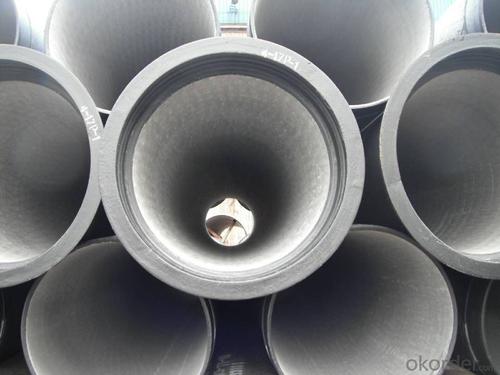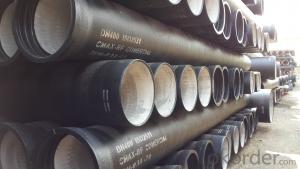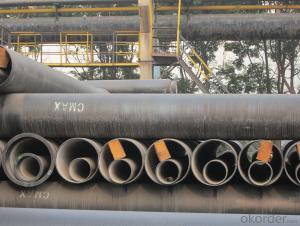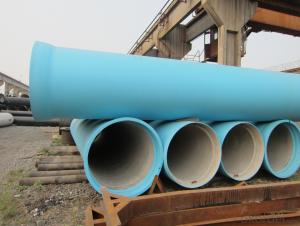DUCTILE IRON PIPE DN2000
- Loading Port:
- China Main Port
- Payment Terms:
- TT OR LC
- Min Order Qty:
- -
- Supply Capability:
- -
OKorder Service Pledge
OKorder Financial Service
You Might Also Like
Specification:
1) The standard of pipe: ISO2531:1998, K9
2) Effective length: 6m
3) Inner cement line: Portland cement line as per ISO4179
4) Zinc coating: at least 130g/m2 as per ISO8179
5) Bitumen painting: at least 70um as per ISO8179
6) With 100% quantity of NBR ring, or SBR ring, or EPDM ring as per ISO4633
7) DN80mm-800mm
8) High strength, lighter than grey iron, good corrosion resistance, no furring, small flow resistance, easy fixing, long life tome about 100 yeas
9) Produced by Hangzhou chunfeng machine
10) Checked by automatic inspection equipment
11) Composition:
Chemical composition | |||
Chemical composition | Ductile Cast Iron Pipe (%) | Grey iron pipe (%) | Steel pipe (%) |
C | 3.5-4.0 | 3.2-3.8 | 0.1-0.2 |
Si | 1.9-2.6 | 1.4-2.2 | 0.15-0.4 |
Mn | 0.15-0.45 | 0.4-0.6 | 0.3-0.6 |
P | ≤0.06 | ≤0.3 | 0.02-0.03 |
S | ≤0.02 | ≤0.1 | 0.02-0.03 |
Mg | 0.03-0.06 |
|
|
12) Feature:
Mechanical properties | |||
| Ductile Cast Iron Pipe | Grey Iron Pipe | Steel Pipe |
Tensile Strength(Mpa) | ≥420 | 150-260 | ≥400 |
Yield Strength(Mpa) | ≥300 | No Confirmation | No Confirmation |
Bending Strength(Mpa) | ≥590 | 200-360 | ≥400 |
Elongation (%) | ≥10 | Neglected | ≥18 |
Brinell Hardness(HBS) | ≤230 | ≤230 | About 140 |
13) T type mechanical joint
14) Packing: in bulk or container
- Q: How do ductile iron pipes handle traffic vibrations?
- Ductile iron pipes are highly resistant to traffic vibrations due to their inherent strength and flexibility. These pipes have the ability to absorb and dissipate the energy generated by traffic vibrations, minimizing any potential damage or stress on the pipes. Additionally, their sturdy construction and high tensile strength make them less susceptible to cracking or breaking under the impact of traffic-induced vibrations. Overall, ductile iron pipes provide excellent performance and durability in handling traffic vibrations.
- Q: What is the expected thermal expansion coefficient of ductile iron pipes?
- The thermal expansion coefficient of ductile iron pipes can vary due to several factors, such as the iron's specific composition and the temperature range of pipe usage. However, as a general rule, ductile iron pipes typically have a thermal expansion coefficient ranging from 10 to 14 x 10^-6 per degree Celsius (10-14 μm/m°C). This means that for every increase of one degree Celsius in temperature, the length of a ductile iron pipe will expand by approximately 10 to 14 micrometers per meter. It is important to acknowledge that these values are not exact and may differ depending on the specific circumstances and application of the pipes.
- Q: Can ductile iron pipes be made into clear tubes?
- Of course, you can also use as a pipe, but because of the appearance of cast iron pipe is not very beautiful, but relatively brittle, by external impact or bad insulation cold winter break, so according to your use of the environment to determine.
- Q: Can ductile iron pipes be used for underground utilities?
- Underground utilities can indeed utilize ductile iron pipes. Renowned for their robustness, strength, and ability to withstand external pressure, ductile iron pipes prove to be a fitting option for subterranean applications demanding remarkable load-bearing capacity, such as utility installations. Furthermore, these pipes exhibit resistance to corrosion, a crucial attribute for underground environments that subject the pipes to dampness and soil conditions. Moreover, ductile iron pipes surpass alternative materials in terms of service life, thereby reducing the necessity for frequent replacements and maintenance. Consequently, ductile iron pipes find widespread application in underground utilities, encompassing water distribution, sewage systems, and gas pipelines.
- Q: Do ductile iron pipes require concrete encasement for support?
- Concrete encasement is typically necessary for providing support to ductile iron pipes. This encasement offers extra stability and strength, safeguarding the pipes against pressure-induced shifting or collapsing. Furthermore, it aids in evenly distributing the load along the pipe's length and shielding it from external forces like soil movement or heavy vehicular activity. In addition to these benefits, concrete encasement helps reduce the likelihood of corrosion or damage caused by external impacts, thereby ensuring the long-lasting durability of the ductile iron pipes.
- Q: Are ductile iron pipes available in different wall thicknesses?
- Yes, ductile iron pipes are available in different wall thicknesses to accommodate various applications and requirements.
- Q: Are ductile iron pipes resistant to hydrogen sulfide corrosion?
- Yes, ductile iron pipes are generally resistant to hydrogen sulfide corrosion. Ductile iron is a type of cast iron that has been treated with magnesium to create a more flexible and durable material. This treatment significantly enhances its resistance to corrosion, including corrosion caused by hydrogen sulfide. The magnesium in the ductile iron forms a protective layer on the surface, preventing the penetration of hydrogen sulfide and other corrosive agents. However, it is important to note that the resistance of ductile iron pipes to hydrogen sulfide corrosion can still be influenced by factors such as the concentration and duration of exposure to the corrosive environment. Therefore, proper maintenance, regular inspection, and appropriate protective measures should still be implemented to ensure the long-term durability and performance of ductile iron pipes in the presence of hydrogen sulfide.
- Q: How does ductile iron pipe perform in areas with high soil corrosivity?
- Ductile iron pipe performs well in areas with high soil corrosivity due to its inherent corrosion resistance. The unique composition of ductile iron, with its graphite nodules providing internal protection, makes it highly resistant to corrosion from soil and external factors. This allows the pipe to maintain its structural integrity and longevity in corrosive environments, making it a reliable choice for such areas.
- Q: What is a slide in type T flexible interface?
- As long as the socket is inserted into the slot, the installation is quick, labor-saving and airtight, and what is good is also good
- Q: Can ductile iron pipes be used for dam construction?
- Yes, ductile iron pipes can be used for dam construction. Ductile iron pipes are known for their strength, durability, and corrosion resistance, making them suitable for a wide range of applications, including dam construction. These pipes can withstand high pressure, making them ideal for transferring water or other fluids within the dam structure. Additionally, their ability to withstand external loads and ground movement makes them a reliable choice for the construction of dams. Ductile iron pipes are also relatively easy to install and maintain, further adding to their suitability for dam construction projects.
Send your message to us
DUCTILE IRON PIPE DN2000
- Loading Port:
- China Main Port
- Payment Terms:
- TT OR LC
- Min Order Qty:
- -
- Supply Capability:
- -
OKorder Service Pledge
OKorder Financial Service
Similar products
Hot products
Hot Searches
Related keywords



























